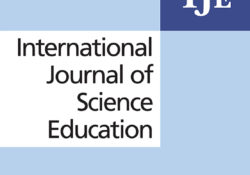tandfonline.com – Exploring core ideas of procedural understanding in scientific inquiry using educational data mining
tandfonline.com har udgivet en rapport under søgningen “Teacher Education Mathematics”: ABSTRACT ABSTRACT Background: Scientific thinking is an essential learning goal of science education and it can be fostered by inquiry learning. One important prerequisite for scientific thinking is procedural understanding. Procedural understanding is the knowledge about specific steps in scientific inquiry (e.g. formulating hypotheses, measuring dependent and varying independent variables, repeating measurements), and why they are essential (regarding objectivity, reliability, and validity). We present two studies exploring students’ ideas about procedural understanding in scientific inquiry using Concept Cartoons. Concept Cartoons are cartoon-like drawings of different characters who have different views about a concept. They are to activate students’ ideas about the specific concept and/or make them discuss them. Purpose: The purpose of this paper is to survey students’ ideas of… Continue Reading

